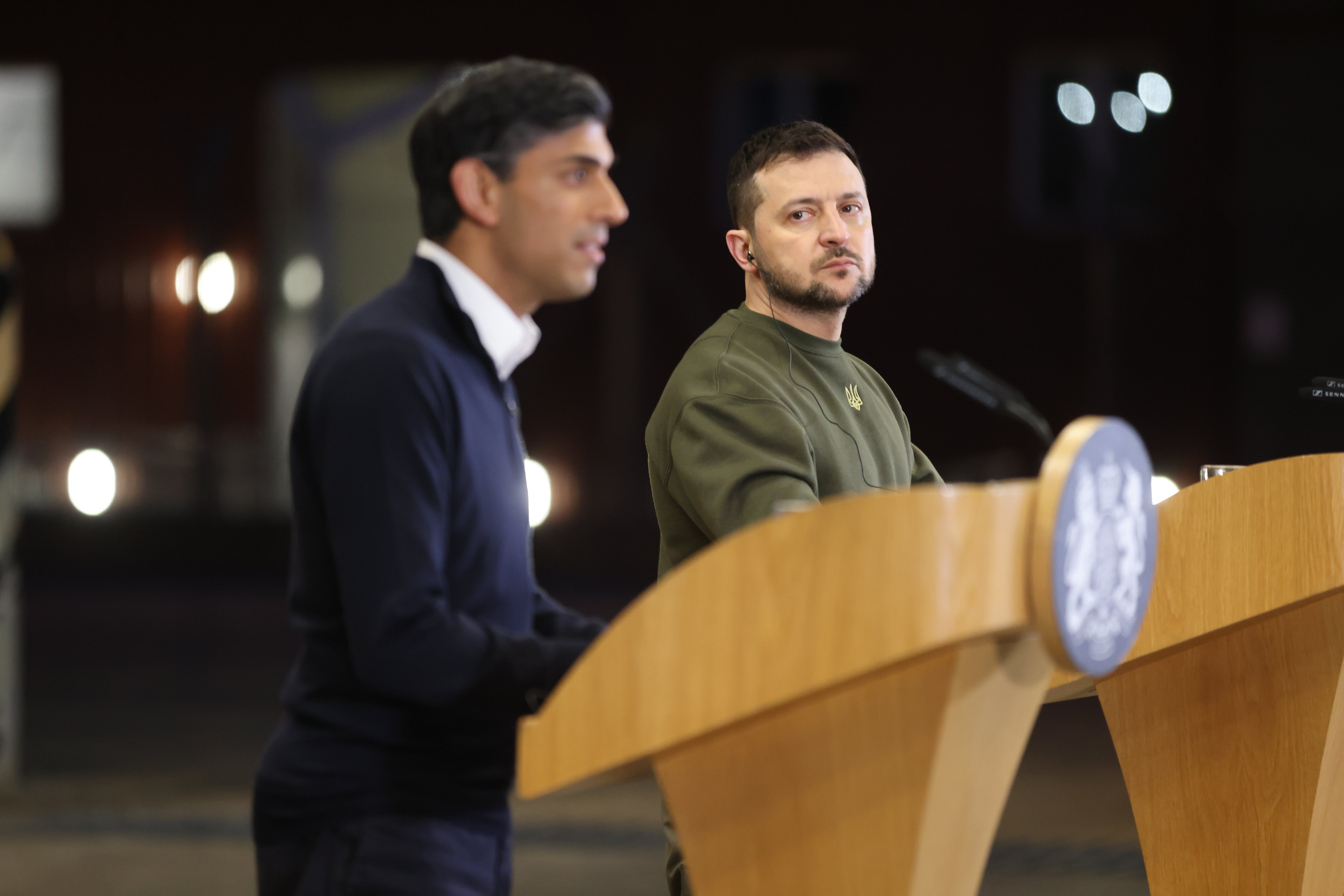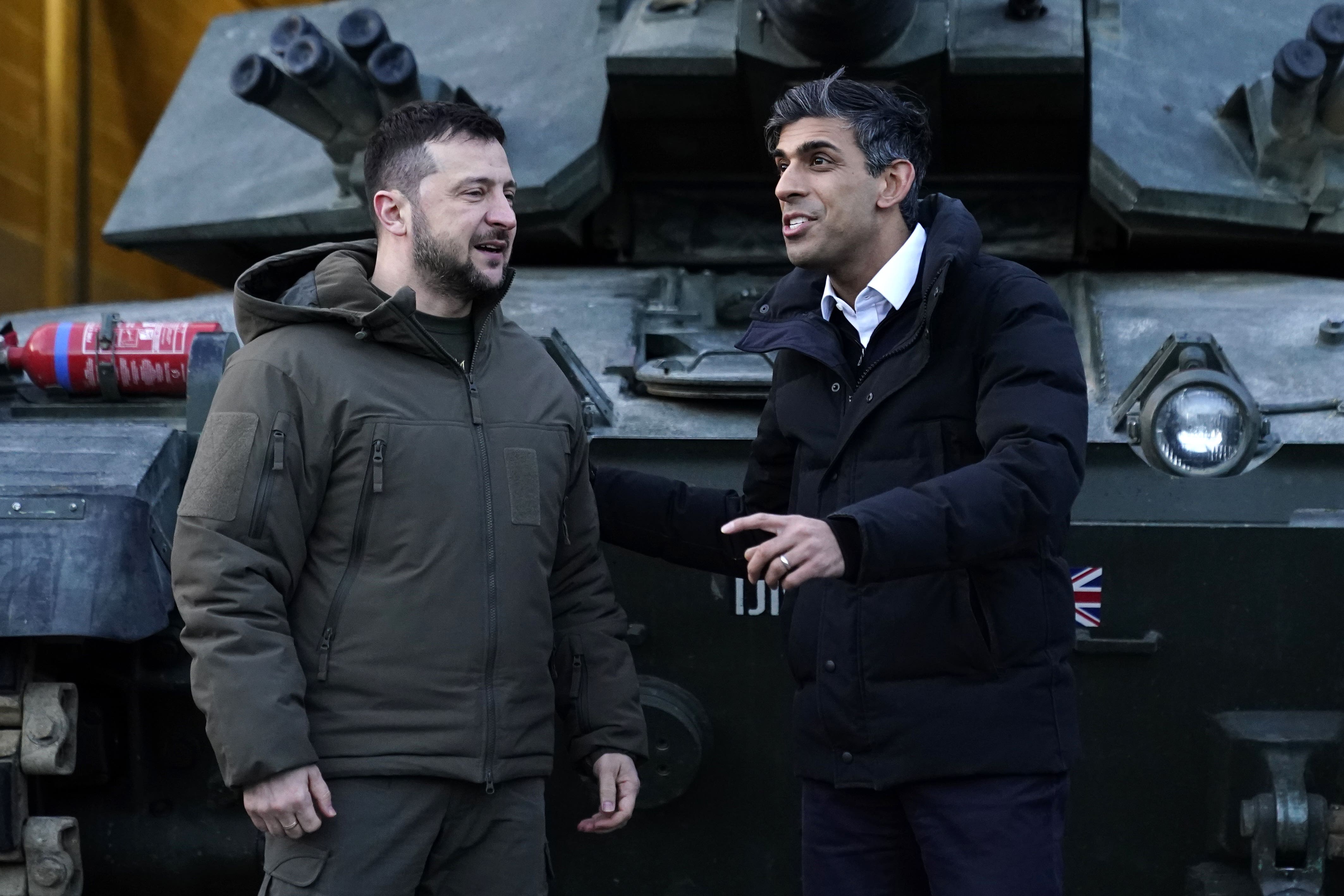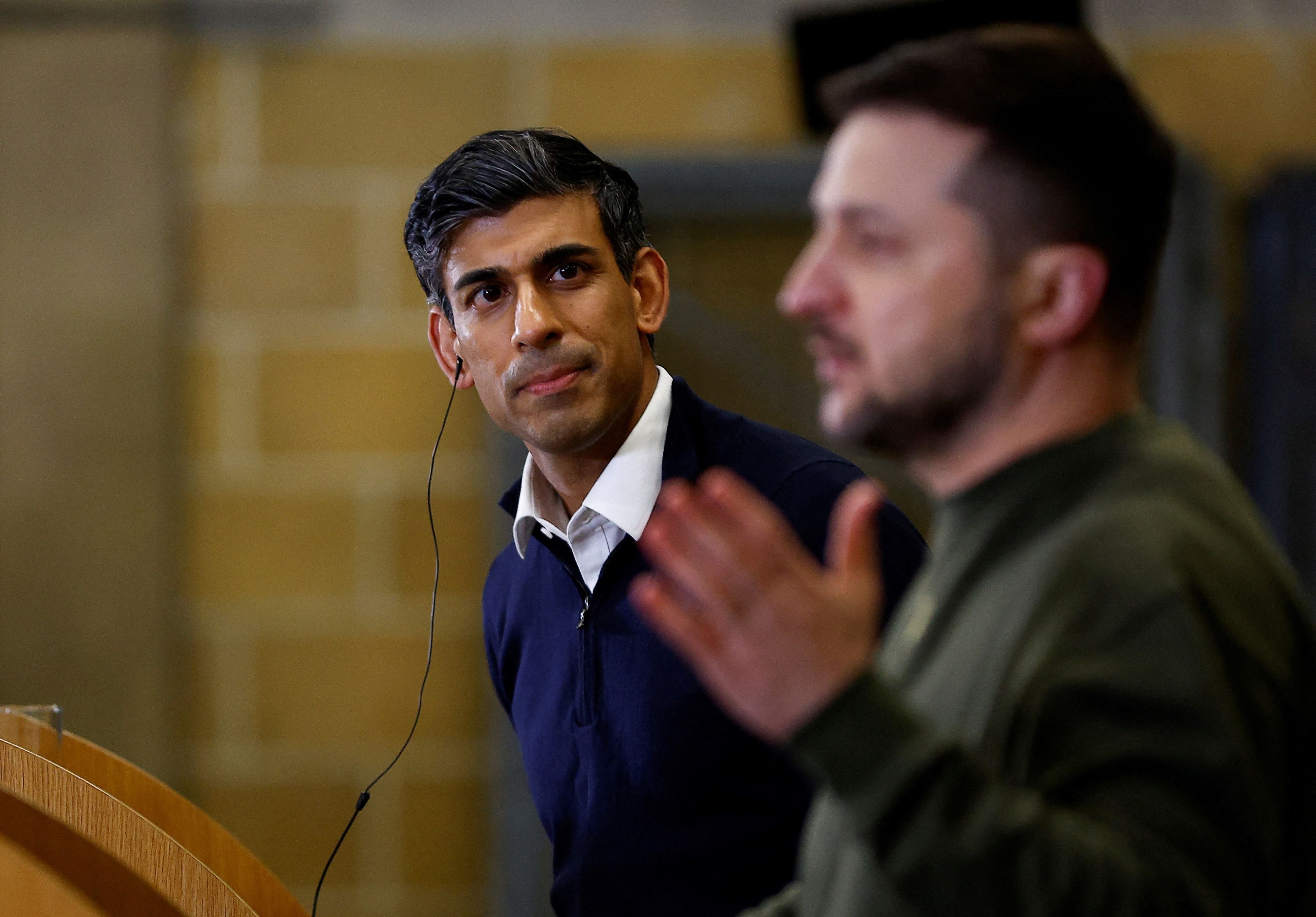UK to investigate what jets it could send to Ukraine as PM answers plea to ‘give us wings of freedom’
Downing Street describes provision of aircraft as a ‘long-term’ possibility

Rishi Sunak has opened the door to sending fighter jets to Ukraine after Volodymyr Zelensky called for “powerful English planes” to boost his country’s war effort.
During a surprise trip to the UK, the Ukrainian leader said Mr Sunak had conveyed to him his “desire” to provide the aircraft. But Downing Street played down the idea that the planes could be given soon, describing the idea as a “long-term” possibility.
The prime minister said that jets were “part of the conversation”, but added that training pilots takes many years, and that the deployment of some of the UK’s military aircraft is governed by treaties “with multiple other countries”.
Mr Sunak came under fresh pressure from his predecessor Boris Johnson, who said that when it comes to providing Ukraine with fighter jets, “the faster we do it, the better”, adding that “helping the Ukrainians now is a massive down-payment on future security”.
The move towards further support was condemned by Russia’s embassy in Britain, which warned against sending fighter aircraft to Ukraine. It said such a move would have “military and political consequences for the European continent and the entire world”, the TASS news agency reported.
In an emotional address to MPs in parliament earlier on Wednesday, President Zelensky called on ministers to provide “wings for freedom”. He praised the UK for “marching with” Ukraine since the start of the Russian invasion almost a year ago, and promised that a Ukrainian victory would “change the world”.
It would be the “most important victory of our lifetime. It will be a victory over the very idea of the war”, which would teach aggressors that they will always lose, he suggested.
Hours earlier, before Mr Zelensky arrived in London, Mr Sunak announced that Britain would train Ukrainian fighter pilots. No 10 also said that the prime minister had asked the defence secretary, Ben Wallace, to investigate which jets could be sent Ukraine, adding that “no decision” had been taken on the issue.
Downing Street described its approach as “multi-year” and emphasised that it currently takes five years to train a pilot in the UK. Britain is also in discussion with other Western allies about the possible supply of fighter jets to Ukraine.
Mr Zelensky met with French president Emmanuel Macron and German chancellor Olaf Scholz in Paris later on Wednesday, and was expected to impress on them the need for military aircraft.

The German chancellor earlier criticised what he called the “public competition” between some countries over who can deliver better weapons to Ukraine, saying it harms unity.
“We preserve and strengthen this cohesion by first preparing decisions confidentially, and only then communicating them,” Mr Scholz said, citing his cooperation with US president Joe Biden on the decision to supply tanks. “What harms our unity is a public competition to outdo each other, along the lines of ‘Battle tanks, submarines, aircraft – who is asking for more?’”
President Biden has previously ruled out sending F-16 fighter jets to Ukraine, but President Macron has suggested that France could back the idea if certain conditions are met.
Last month, Germany and the US followed the UK in announcing they would send tanks to Ukraine, after months of pleas and international pressure.
During his speech to parliament, President Zelensky urged Britain to send jets ahead of an expected Russian offensive.

The Ukrainian leader thanked Britain “in advance for powerful English planes”, which he has repeatedly asked for in a bid to gain an advantage over Vladimir Putin’s forces.
Before a meeting with King Charles at Buckingham Palace, he said: “In Britain, the King is an air force pilot. In Ukraine, today, every air force pilot is a king.”
He also presented Commons speaker Sir Lindsay Hoyle with the helmet of a Ukrainian fighter pilot he called an “ace”. The inscription on it read: “We have freedom. Give us wings to protect it.”
Later, following a private meeting with President Zelensky in Downing Street, Mr Sunak told MPs that the UK must ensure a “decisive military victory” for Ukraine.
The UK also announced a fresh package of sanctions on Russian companies and allies of Mr Putin, to coincide with the surprise visit.

CST, a manufacturer of Russian drones, and RT-Komplekt, which produces parts for helicopters used in the war against Ukraine, are among the entities sanctioned.
Five individuals linked to Mr Putin’s luxury residences, including the presidential commissioner for entrepreneurs’ rights, Boris Titov, and Aerostart owner Viktor Myachin, were also hit with travel bans and asset freezes.
Foreign secretary James Cleverly said the sanctions would “accelerate the economic pressure on Putin” by “undermining his war machine to help Ukraine prevail”.
Mr Sunak has also offered longer-range firepower to help counter Russia’s ability to strike at Ukraine’s towns and energy facilities, No 10 said. Ukrainian troops are already being trained in the use of Challenger 2 tanks, which are expected to be sent to the country next month. The first Ukrainian pilots are not due to arrive in the UK until the spring.





Join our commenting forum
Join thought-provoking conversations, follow other Independent readers and see their replies
Comments